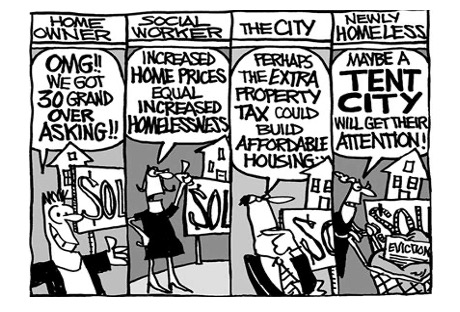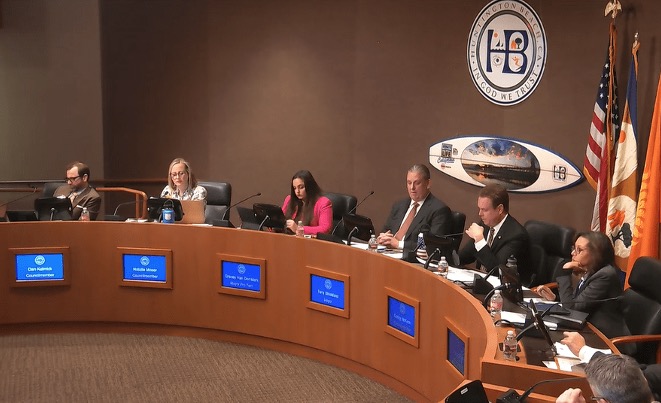Comments
PLANNING WATCH - In response to a lawsuit from the State of California to force Huntington Beach to comply with California Senate Bill 9 and ADU laws to increase its zoning capacity, Huntington Beach has counter-sued the State. If successful, the counter-suit would stop the State from forcing California cities and countries to deregulate their zoning laws. The State’s approach, which I have often debunked, is that homelessness results from a housing shortage. If the State forces cities, like Huntington Beach, to increase their zoned capacity, developers are supposed to build more housing and homelessness miraculously disappears. While this argument is totally fallacious, ceaseless repetition has convinced many people that the deregulation of zoning reduces homelessness.
The basis of Huntington Beach’s counter lawsuit is that cities control local land use and not the state. Their lawsuit states:
- This Complaint arises from violations of the U.S. Constitution and California Constitution and State Statutes, i.e., the Governor, the Director, HCD, SCAG, and other Defendants have commandeered the rightful and constitutional autonomy and Charter City authority of the City regarding local land use matters . . .
- As a practical matter if allowed to proceed, the State, through its Governor, the Director, and the State’s administrative agency, HCD, will continue with an unbridled power play to control all aspects of the City Council’s land use decisions in order to eliminate the suburban character of the City and replace it with a high-density mecca. This will be done through the forced rezoning for high-density housing, including allowing developers to construct high-density projects leaving the City Council with no discretion to deny or condition invasive high-density development.
While technically correct, Huntington Beach’s objections are weak. A much stronger argument would have been that up-zoning, whether voluntary like Los Angeles, or imposed by the State and enforced by State Attorney General Rob Bonta, cannot solve the homeless crisis. Zoning deregulation only enriches property owners and developers, and this is the State’s hidden agenda. Eliminating homelessness is nothing more than a public relations stunt to convince the public of a big lie, that generous up-zoning handouts to developers reduce homelessness, a shocking social problem that upsets their constituents. But in the real world these handouts increase economic inequality and therefore make the housing crisis worse.
The implication of Huntington Beach’s counter-suit is that upzoning might solve the housing crisis, but that cities should make that call, not Sacramento. Their argument, however, ignores a basic fact, upzoning does not reduce the cost of housing. It makes the housing crisis worse by increasing economic inequality and the cost of land. It also increases developer profits, overcrowding, and homelessness by inflating the cost of housing.
This is why. When State legislation forces cities and counties to upzone, it raises property values because it expands the list of permitted uses, increases permitted density and height, and reduces parking requirements. This is why up-zoning grants generous windfalls to ecstatic property owners, developers, and lobbyists. Upzoning increases the market value of houses and is a boon to house flippers. Alternatively, property owners and developers can also profit from up-zoning by building taller, denser, under-parked market-rate housing.
Either way, the cost of housing goes up because the price of land goes up. This explains why these housing reforms consistently fail and why cities, especially Los Angeles, do not accurately monitor their housing programs.

There are also other reasons, too, why up-zoning makes the housing crisis worse:
- Upzoning is based on the myth of a housing shortage. Even though California’s and LA’s population is declining and For Rent signs are visible across the city, the up-zoners still claim that LA does not have enough housing. What they overlook is that poor people cannot rent or buy expensive housing. The housing shortage they frequently cite only applies to low-priced, non-market housing, not the high-end housing resulting from up-zoning.
- Developers do not respond to up-zoning unless they profit from it. Cities can give developers a long list of incentives, but it takes more than expanded zoning capacity to spur private investment in housing. Cities, including Huntington Beach, cannot force developers to build anything, even when their revised laws allow it. Furthermore, without up-zoning cities like Los Angeles grant nearly all developer applications for zone changes and zone variances.
- Wage stagnation and economic inequality have dramatically increased in recent decades, forcing many people to leave Los Angeles, live in overcrowded conditions, or end up homeless.
- Speculation by investors in houses and apartments has increased housing prices faster than wages. Large real estate companies, like Blackstone, have heavily invested in houses and apartments. They generate income during downtimes and can be sold off as inflated assets during housing bubbles.
- Termination of HUD and CRA public housing programs. The end of HUD public housing programs and the dissolution of California’s Redevelopment Agencies left one public housing program: Section 8 apartment vouchers. But Section 8 is seriously underfunded. 90 percent of those who apply for Section 8 housing do not get a voucher, and half of those who get a voucher fail to find a landlord who accepts it.
For those serious about housing the homeless, these five concerns identify better public policies. This is why I am critical of Huntington Beach’s lawsuit. It plays into the hands of up-zoners, who argue that their opponents goal is protection of the status quo. If Huntington Beach and their supporters had argued that upzoning makes the housing crisis worse, they would have made a stronger argument that also fends off critics who denigrate them as NIMBYs.
(Dick Platkin is a retired Los Angeles city planner who reports on local planning issues for CityWatchLA. He serves on the board of United Neighborhoods for Los Angeles (UN4LA). Previous Planning Watch columns are available at the CityWatchLA archives. Please send questions and corrections to [email protected].)
